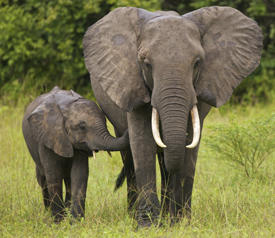Reading's 'dictionary' of 1.4m global species migrates to Holland
Release Date 01 November 2013

The University of Reading is delighted to announce that its work in creating a unique list of all life on Earth is set to be continued by a leading research centre in Holland.
The Catalogue of Life (CoL), which the University of Reading began in 1997, holds essential information on the names, relationships and distributions of over 70% of known species. With degradation and loss of global biodiversity a key issue of our time, the CoL is a crucial resource for biodiversity and conservation groups in their efforts to protect life on Earth.
COL is a remarkable global project. It's founded on over 140 global species databases and the knowledge of over 3,000 taxonomic¹ specialists. Expert teams peer review the databases and integrate them into a single coherent catalogue, establishing a single hierarchical classification of species.
Dr Alastair Culham, from the University of Reading's School of Biological Sciences, said: "We are enormously proud to have begun this wonderful ‘dictionary' of global species which is now used around the world as a vital biodiversity research resource. To understand the rate of which species are dying out, we need to know how many there are and where they live to begin with. That information didn't exist in one place before the Catalogue of Life.
"Its success is due to the hard work and expertise of colleagues at Reading, and our partners around the world. Key to this is the willingness of major infrastructures such as the Integrated Taxonomic Information System in the USA, World Register of Marine Species and the Chinese Academy of Sciences, to work alongside individual experts to bring together their data. The University of Cardiff and Naturalis contribute with their computer science expertise."
The initial aim was to have completed the CoL by 2000 however it became clear that reaching the target of 1.9m known species was unrealistic. Far less taxonomic data was readily accessible than was first expected but after the first publication (2000), which contained about 10% of known species. Through subsequent grants and projects however the Catalogue has now reached a remarkable 1.4m species.
Donald Hobern, Executive Secretary of Global Biodiversity Information Facility, said: "We can't protect the world's plants and animals without keeping track of all the species we have found. The Catalogue of Life is a tool that helps us do this. Hundreds of experts from many countries have freely contributed their knowledge to this list. Scientists all over the world use it every day to organise everything we know about the world's plants and animals."
From 1 November, the management and day-to-day running of the CoL will be undertaken by Naturalis in Leiden, Holland.
"Reading built up the Catalogue from scratch with the late Professor Frank Bisby the key instigator," continued Dr Culham. "It has now moved from a piece of research science to become a major infrastructure that needs to be housed in a core-funded research institution. The Catalogue will be in safe hands at Leiden for the next five years when there will be an opportunity for another leading institution to host it. We will continue to take a strong interest in its work by providing our global species databases and by continuing our outreach activities to promote Catalogue of Life. New species continue to be discovered at the rate of several thousand a year, and genomic techniques are now challenging our ideas of how many undiscovered species remain, so Naturalis faces some exciting challenges!"
¹ Taxonomy is a field of science that encompasses the description, identification, nomenclature, and classification of organisms
For media enquiries please contact James Barr on 0118 3787115
